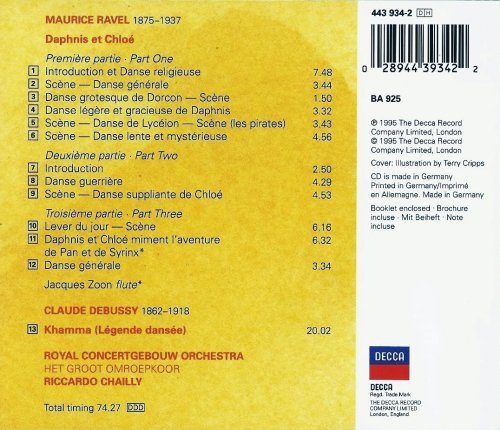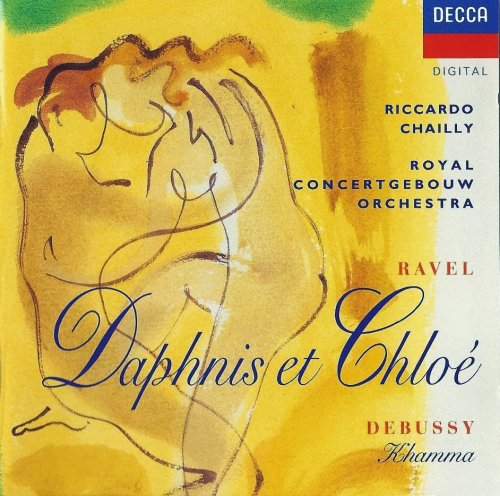
Riccardo Chailly - Ravel: Daphnis et Chloé (1995)
BAND/ARTIST: Riccardo Chailly
- Title: Ravel: Daphnis et Chloé
- Year Of Release: 1995
- Label: Decca
- Genre: Classical
- Quality: FLAC (image+.cue,log,scans)
- Total Time: 74:27
- Total Size: 312 mb
- WebSite: Album Preview
Tracklist:
Maurice Ravel (1875-1937):
Daphnis Et Chloé
Première Partie / Part One
1. Introduction Et Danse Religeuse 7:48
2. Scene — Danse Générale 3:44
3. Danse Grotesque de Gorcon — Scène 1:50
4. Danse Légère Et Gracieux de Daphnis 3:32
5. Scène — Danse de Lycéoin — Scène (Les Pirates) 3:43
6. Scène — Danse Lente Et Mystérieuse 4:56
Deuxième Partie / Part Two
7. Introduction 2:50
8. Danse Guerrière 4:29
9. Scene — Danse Suppliante De Chloé 4:53
Troisième Partie / Part Three
10. Lever Du Jour — Scène 6:16
11. Daphnis Et Chloé Miment L'aventure De Pan Et De Syrinx 6:32
12. Danse Générale 3:34
Claude Debussy (1862-1918):
13. Khamma (Légende Dansée) 20:02
Performers:
Het Groot Omroepkoor
Concertgebouw Orchestra
Riccardo Chailly - conductor

Maurice Ravel (1875-1937):
Daphnis Et Chloé
Première Partie / Part One
1. Introduction Et Danse Religeuse 7:48
2. Scene — Danse Générale 3:44
3. Danse Grotesque de Gorcon — Scène 1:50
4. Danse Légère Et Gracieux de Daphnis 3:32
5. Scène — Danse de Lycéoin — Scène (Les Pirates) 3:43
6. Scène — Danse Lente Et Mystérieuse 4:56
Deuxième Partie / Part Two
7. Introduction 2:50
8. Danse Guerrière 4:29
9. Scene — Danse Suppliante De Chloé 4:53
Troisième Partie / Part Three
10. Lever Du Jour — Scène 6:16
11. Daphnis Et Chloé Miment L'aventure De Pan Et De Syrinx 6:32
12. Danse Générale 3:34
Claude Debussy (1862-1918):
13. Khamma (Légende Dansée) 20:02
Performers:
Het Groot Omroepkoor
Concertgebouw Orchestra
Riccardo Chailly - conductor
You would expect this Daphnis to sound superb, and, of course, it does. The dynamic range is almost as wide as Rattle and EMI's idealistic rather than realistic (in gramophone terms) rendering, with just a little more focus for instruments that glitter, and for those on the verge of audibility. But Rattle and EM! didn't have the advantage of the Concertgebouw acoustic: the full flood of choral tone at the climax of Chailly's "Daybreak" (the famous first scene of Part 3) has to be heard to be believed (Chailly's timing of this sunburst is masterly), and it hardly needs saying that this new disc's ability to astonish with decibels at climaxes is greater than Decca's previous Dutoit or Monteux recordings (the off-stage shepherds earlier on in this scene - piccolo and clarinet solos are genuinely off-stage; an inventive touch).
Possibly the machine is cranked with excessive enthusiasm, and that is something Chailly should have seen to. And I did have the impression that the strange lights scenes of Daphnis were not enjoyed or exploited for the strangeness that can result from even the ordinary (i.e. musical) instruments being asked to play or phrase in unusual ways - compare Rattle or Nagano. Chailly is faster, too, in the dance scenes where, if you are Sir Simon Rattle, lingering leads to marvels of characterization (Daphnis's "Dance gracieuse", Chloe's "Dance of Supplication" and the "Pantomime"), which is not to say that Chailly is bland.
And blandness is emphatically the last word I would use to describe Chailly's way with Debussy's Khamma. I had long been hoping that a great orchestra and star conductor would turn their attention to this immediately pre-Jeux (conceptually speaking) ballet; a sort of Egyptian Salome-cum-Rite of Spring, in as much as Khamma dances herself to death for the Sun God Amun-Ra that he might be persuaded to save the city from siege. The ominous opening pages here are immediately gripping: a Nibelheim-like family of lower woodwind slithering around (only partially heard on Tortelier's rival Chandos version), marvellously focused drum, and trumpet fanfares that genuinely do "give one the shivers" as Debussy asserted. In general, Chailly, Decca and these superb musicians realize more of the score's "discoveries of harmonic chemistry" and sheer theatre than one dared imagine possible. But why no linked tracking with the synopsis? When the piece is unfamiliar, and the musicians and recording team have gone to this much trouble, it won't do for post-production to relegate it to the status of a filler.
Possibly the machine is cranked with excessive enthusiasm, and that is something Chailly should have seen to. And I did have the impression that the strange lights scenes of Daphnis were not enjoyed or exploited for the strangeness that can result from even the ordinary (i.e. musical) instruments being asked to play or phrase in unusual ways - compare Rattle or Nagano. Chailly is faster, too, in the dance scenes where, if you are Sir Simon Rattle, lingering leads to marvels of characterization (Daphnis's "Dance gracieuse", Chloe's "Dance of Supplication" and the "Pantomime"), which is not to say that Chailly is bland.
And blandness is emphatically the last word I would use to describe Chailly's way with Debussy's Khamma. I had long been hoping that a great orchestra and star conductor would turn their attention to this immediately pre-Jeux (conceptually speaking) ballet; a sort of Egyptian Salome-cum-Rite of Spring, in as much as Khamma dances herself to death for the Sun God Amun-Ra that he might be persuaded to save the city from siege. The ominous opening pages here are immediately gripping: a Nibelheim-like family of lower woodwind slithering around (only partially heard on Tortelier's rival Chandos version), marvellously focused drum, and trumpet fanfares that genuinely do "give one the shivers" as Debussy asserted. In general, Chailly, Decca and these superb musicians realize more of the score's "discoveries of harmonic chemistry" and sheer theatre than one dared imagine possible. But why no linked tracking with the synopsis? When the piece is unfamiliar, and the musicians and recording team have gone to this much trouble, it won't do for post-production to relegate it to the status of a filler.

Classical | FLAC / APE | CD-Rip
As a ISRA.CLOUD's PREMIUM member you will have the following benefits:
- Unlimited high speed downloads
- Download directly without waiting time
- Unlimited parallel downloads
- Support for download accelerators
- No advertising
- Resume broken downloads


